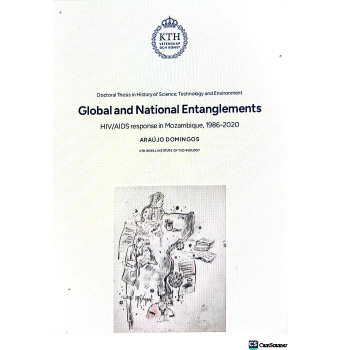Global and National Entanglements HIV/AIDS response in Mozambique, 1986-2020

Araújo Domingos, Division of History of Science, Technology and Environment, defended his doctoral thesis on Monday 10 September 2025.
What is the topic of your doctoral thesis?
The thesis is about Mozambique’s response to HIV/AIDS from the late 1980s to 2020. The study falls under the umbrella of mankind’s historical response to pandemics. Mozambique has globally and regionally featured in the top positions in both HIV prevalence and people living with HIV/AIDS. Research explanations to this trend has varied. The present thesis analyses Mozambique’s response to HIV/AIDS through four case studies: media, policies, the inclusion of traditional healers and the participation of civil society organisations.
Why did you choose this topic?
The interest for the theme derived from my work experience in rural development projects in non-governmental organisations working in the arena of HIV/AIDS from the end of 2010 to 2012 in Mozambique. It also stemmed from my charity work with HIV/AIDS patients in their terminal stage of life (before many Sub-Saharan countries had access to anti-retroviral drugs) in Chilanga Hospice in Zambia in the early 2000s. This work experience was coupled with the aforementioned Mozambique’s higher standing in HIV prevalence and number of people living with HIV/AIDS, scarcity of studies of HIV/AIDS response with comprehensive historical focus in the country, as well as the fact that HIV/AIDS related complications have accounted for the majority of death cases for more than a decade.
What are the most important results?
The main finding is that Mozambique’s response to HIV/AIDS has been characterised by a permanent conflict or tension between global and national human and non-human actors, which per se constitutes a form of resistance.
First, this has been characterised by Notícias (government’s print press) tensions in framing HIV/AIDS. Notícias’ framing of HIV/AIDS in Mozambique suffered from three dilemmas: maintaining the government’s former centralised and grassroots-orientated leftist ideology of health services in the context of the liberal market; balancing the influence of the HIV/AIDS global multilateral and bilateral actors and the government’s intention of translating HIV/AIDS response to the Mozambican specific context; and portraying a nationalist and positive image of thegovernment’s performance in Mozambique’s non-fully plausible societal practices for an effective HIV/AIDS response.
Second, HIV/AIDS policy changes have been characterised by permanent tension between the call for a laissez-faire state (minimum state) and the former interventionist state (maximum state). This took form through the tension between HIV/AIDS global policies and the government’s historical leftist policies of decentralisation, massification and integration of health services in primary health care.
Third, the inclusion of traditional healers in the HIV/AIDS (and health in general) response in Mozambique in the early 1990s (as opposed to their exclusion and persecution in the both the colonial and post-independence eras) has constituted a way to ensure their assimilation into biomedical knowledge and practices as well as enhance control over their knowledge and practices, thus, portraying a non de facto participation. It has also constituted a way to the exercise of governmentality and bio-power over their knowledge and practices. Thus, their former colonial and post-independence status (when were deemed to be obscurantists and superstitious) still linger.
Fourth, in this case study I analyse the sustainability of civil society organisations working in the HIV/AIDS response beyond financial indicators. The inclusion of civil society organisations in the HIV/AIDS response in the early 1990s yielded high expectations as to the promotion of efficiency and efficacy in the fight against the pandemic. However, their stainability has heavily been criticised due to their heavy financial dependecne on the foreign donors. The study found that the problem of sustainability of civil society organisations working in the HIV/AIDS in Mozambique since the 1990s is not only related to scarce financial resources but also to their externally-driven emergence, constrained public sphere (constrained political and legal environment), and lack of legitimacy and credibility before the population in general.
Did you come across anything unexpected during your thesis research?
Personally I was involved in accident, which made me pause for a significant lap of time and constrained my movement for data collection or fieldwork, as well as the pace in writing my thesis.
Who will benefit from your results? What kind the impact may the thesis have on surrounding society?
There is a set of beneficiaries from the results of this thesis: researchers, governments, global UN multilateral health actors (e.g. WHO, UNAIDS), non-UN multilateral actors (e.g. the World Bank), non-UN bilateral actors (e.g PEPFAR), public-private ventures actors (e.g. The Global Fund) and civil society organisations in general. Global health actors are called upon to consider national contexts, as well as the omnipresence of power in the HIV/AIDS response (global and national actors, including national political, socioeconomic, cultural contexts) in the design/conception to the evaluation of global health agendas. The surrounding context will benefit from enhanced inclusion and democratic processes in the conception and implementation of global and national health policies.
What will you do next and where can one reach you?
After my return to Mozambique, I will be teaching in a university. However, while teaching I will also apply for PostDoc research opportunities in Africa or globally. I will be reached through my email: aramequedomingos@gmail.com
